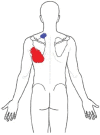Immediate improvement in the cranio-cervical flexion test associated with MDT-based interventions: a case report
- PMID: 27956822
- PMCID: PMC5125429
- DOI: 10.1179/2042618614Y.0000000081
Immediate improvement in the cranio-cervical flexion test associated with MDT-based interventions: a case report
Abstract
The patient in this case study presented with constant idiopathic neck pain and left lower scapular pain (greater than 3 months) and was treated based on the principles of Mechanical Diagnosis and Therapy (MDT). Retraction exercises produced centralization of the lower scapular pain to the upper part of the scapula at the initial visit. At the first visit, the performance level on the Cranio-Cervical Flexion Test (CCFT) was ≤20 mmHg before the treatment. At the conclusion of the treatment during which centralization occurred, the CCFT level improved to 24 mmHg. At the second visit, all symptoms were abolished and cervical range of motion (ROM) was fully restored by performing repeated extension in lying from a retracted position with clinician's traction. The CCFT levels before and immediately after the treatment were 24 and 26 mmHg, respectively. At the third visit (1 week after the initial visit), he noted that all daily activities could be performed without pain. The CCFT level was maintained at 26mmHg. The patient in this study showed immediate improvement in the CCFT through the treatments based on MDT. This suggests a possible link between MDT interventions and motor control of the cervical spine and a need to further investigate this relationship.
Keywords: Assessment; Deep cervical flexors; MDT; McKenzie; Motor control; Neck pain.
Figures


References
-
- Falla D, Jull G, Hodges PW. Feedforward activity of the cervical flexor muscles during voluntary arm movements is delayed in chronic neck pain. Exp Brain Res. 2004;157:43–8. - PubMed
-
- Falla DL, Jull GA, Hodges PW. Patients with neck pain demonstrate reduced electromyographic activity of the deep cervical flexor muscles during performance of the craniocervical flexion test. Spine (Phila Pa 1976). 2004;29:2108–14. - PubMed
-
- Schomacher J, Farina D, Lindstroem R, Falla D. Chronic trauma-induced neck pain impairs the neural control of the deep semispinalis cervicis muscle. Clin Neurophysiol. 2012;123:1403–8. - PubMed
-
- Lindstrom R, Schomacher J, Farina D, Rechter L, Falla D. Association between neck muscle coactivation, pain, and strength in women with neck pain. Man Ther. 2011;16:80–6. - PubMed
-
- Falla D, Farina D, Graven-Nielsen T. Experimental muscle pain results in reorganization of coordination among trapezius muscle subdivisions during repetitive shoulder flexion. Exp Brain Res. 2007;178:385–93. - PubMed
LinkOut - more resources
Full Text Sources
Other Literature Sources
